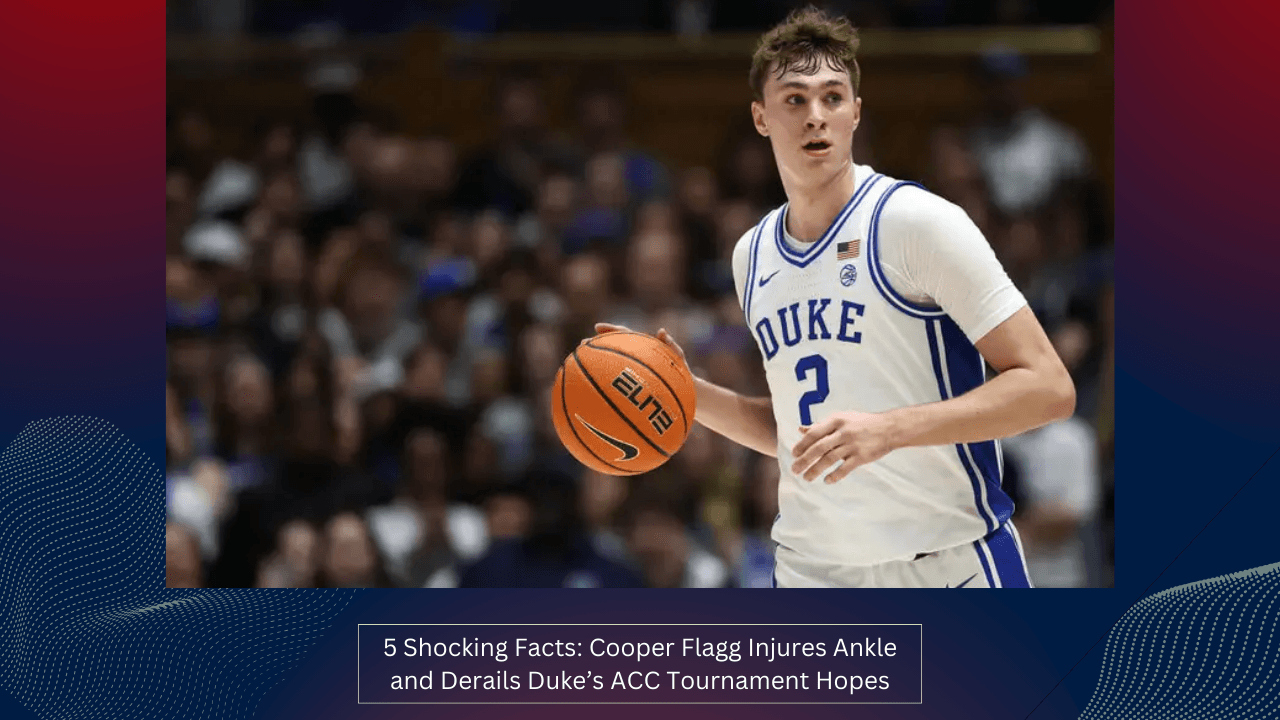
Table of Contents
- Overview of the Injury
- 5 Shocking Facts Behind the Incident
- Impact on Duke’s Tournament Run
- Expert Opinions and Future Outlook
- Conclusion
Overview of the Injury
During a critical ACC tournament matchup, Cooper Flagg injures ankle when he twisted it while trying to grab a rebound. In an effort to secure a key play, Flagg jumped and awkwardly landed on a teammate’s foot, causing his left ankle to twist severely. The immediate reaction was dramatic; he crumpled to the court and was visibly frustrated as he slammed his fists on the bench before being assisted off by his teammates.
This unfortunate event not only halted Flagg’s play but also forced Duke to scramble and adjust their rotation on the fly. The sudden absence of one of their brightest young stars has cast a long shadow over the Blue Devils’ momentum in what was a promising tournament run.
5 Shocking Facts Behind the Incident
The injury that saw Cooper Flagg injure ankle has several surprising aspects:
- Timing of the Injury: Flagg’s injury occurred with just 2:46 remaining in the first half—a crucial moment when Duke was mounting a comeback against Georgia Tech.
- Mechanism of Injury: The injury happened when Flagg jumped for a rebound and landed awkwardly on a teammate’s foot, causing a severe twist in his left ankle.
- Immediate Impact: The moment Cooper Flagg injures ankle, he was quickly assisted off the court and subsequently seen in a wheelchair, heading for an urgent X-ray, which highlights the severity of the injury.
- Team Morale and Strategy: With Flagg sidelined, Duke was forced to rely on less experienced players such as freshman big Patrick Ngongba and graduate wing Mason Gillis, dramatically affecting team performance.
- Broader Implications: Flagg’s injury, coupled with another setback involving forward Maliq Brown, jeopardizes Duke’s ACC and NCAA tournament future as both players are vital to the team’s success.
Impact on Duke’s Tournament Run
The injury to Cooper Flagg injures ankle comes at a critical juncture for Duke. As the Blue Devils recently clinched the outright ACC regular-season title, expectations for a deep tournament run were sky-high. However, the sudden loss of Flagg, who leads Duke in key statistical categories, has significantly weakened the team’s offensive and defensive balance.
Moreover, with forward Maliq Brown also sidelined by a re-aggravated shoulder injury, Duke is forced to adjust its strategy. Head coach Jon Scheyer now faces the daunting challenge of relying on emerging talent and recalibrating game plans on the fly. This unplanned shift not only disrupts team chemistry but may also have lasting effects on their postseason performance.
Expert Opinions and Future Outlook
Analysts have weighed in on the fallout from the injury. Some experts, like Alexander Edwards from Strategic Vision, warn that Duke’s championship window may be closing if such key players remain sidelined. Conversely, other experts believe that Duke’s depth could allow the team to overcome this setback if they quickly regroup.
Coach Scheyer has emphasized the importance of resilience and adaptability, stating that the team will work tirelessly to overcome the setback. The incident has sparked discussions on the need for better injury prevention protocols and more comprehensive support systems for student-athletes. However, the long-term impact on Duke’s ACC tournament and NCAA championship aspirations remains uncertain.
For further expert analysis, read the latest reports on college basketball at Sports Illustrated College Basketball.
Conclusion
The shocking moment when Cooper Flagg injures ankle has sent ripples through the college basketball world, affecting both team strategy and championship aspirations. As Duke scrambles to adjust its lineup and recover from the sudden loss of one of its key players, the full ramifications of this injury will unfold in the coming weeks.
Ultimately, the resilience of the Blue Devils will be tested as they attempt to overcome this significant setback. The incident serves as a stark reminder of the unpredictable nature of sports and the fine line between triumph and disaster. Moving forward, Duke must focus on recovery and adaptation to stay competitive in both the ACC and NCAA tournaments.

